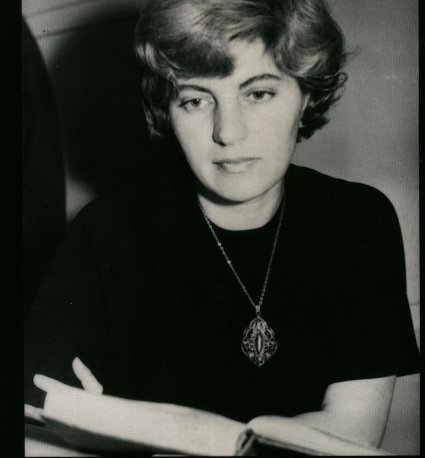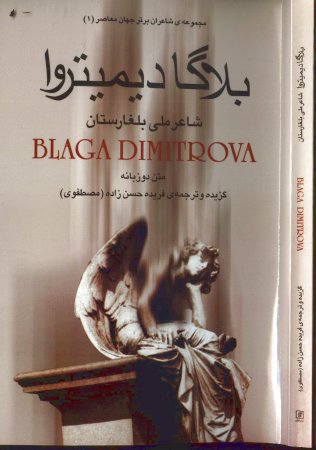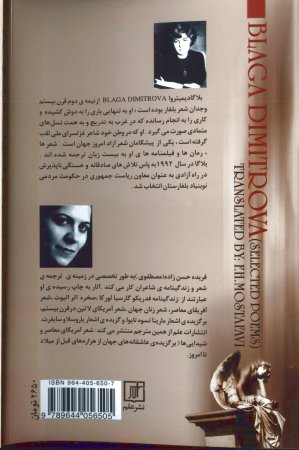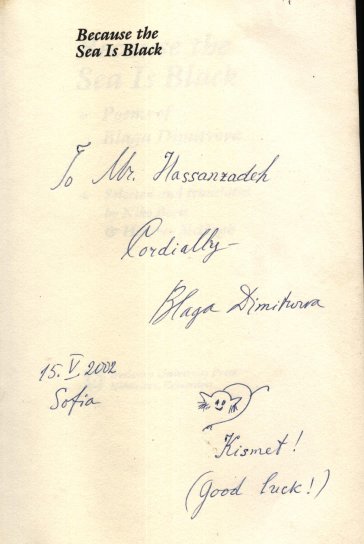Interview with Blaga Dimitrova’s Poetry by Farideh Hassanzadeh-Mostafavi
Farideh Hassanzadeh (Mostafavi), an Iranian poet, has translated poems by Blaga Dimitrova into Farsi. She wrote to Dimitrova and asked for an interview. The great poet was in her last days and could only send her books. Farideh decided to arrange an interview with the poetry of her favorite poet. Here is the interview, with answers from the books Scars, The Last Rock Eagle, Because the Sea is Black, and Forbidden Sea.
Blaga Dimitrova is one of the most significant contemporary Bulgarian poets. An independent person and artist, she cannot easily be grouped with others in what is for convenience called a “poetic generation.” With her collections of poems, several novels and plays, and many articles and essays, she is widely read in Bulgaria and has a prominent international reputation.
At the same time, Dimitrova is one of the most outstanding personalities in contemporary Bulgarian social and political life. An author of strong moral concern, she creates works that are predominantly reflexive, but in which the intellectual quest is never allowed to overwhelm the artistic vision. A dominant characteristic of her ars poetica is her confidence in the Word—its magic, its creative potentials, and its ability to create its own universe that coexists with reality.
Dimitrova’s books have been translated into more than 20 languages. She has won the Herder Prize, the Hristo G. Danov Prize, the French Medal of Merit for Freedom, and the Kogge Prize. She dedicated her life to the fight for human rights and political reform. Her struggle was rewarded by the emergence of a new democratic Bulgaria, with Dimitrova as its Vice-President. Blaga Dimitrova died of Apoplexy in May 2003.
Blaga Dimitrova’s handwriting for Farideh Hassanzadeh:

Blaga, dear! What is your interpretation of the word “poet”?
Prometheus who dared to steal
from the Gods,
not fire,
but the word.
Are your poems difficult to write?
A poem comes suddenly
like snow in May,
like sunstroke or love.
You can wait all your life
on the ice floe of a sterile
sheet of paper.
You can fly over the whole world
on transatlantic, transplanet,
transcendental wings
And never see it in a dream
or in a mirage
if it doesn’t flare in you.
Then the slippery ice wakes
from its white nothingness
and sprouts words.
Bristling and whirling,
it fights the tide and carries you
towards icebergs and abyss,
until it melts into a poem.
Your goals in life?
I was always distracted
from my goal in life
I was always diverted, late,
missed deadlines.
But now, looking back,
I see how much
I would have missed,
If I had perfectly pursued my goal.
(By the way, what was it?)
What is eternal in this mortal world?
The most transient
Is what we call eternal:
friendship,
fame,
power,
success,
victory.
Only the most fragile lasts:
A deep scar left by love.
What is true love in your view ?
If somebody had ever loved me
for my thick hair,
the color of a gold-flecked wasp
and the smell of doe’s sweat
(I run like crazy) –
he would have sleepily loved
the shadow of the wind.
If somebody
had loved me sometimes,
or even one time,
for my sadness–
unexplained, unfounded
as a cuckoo’s
he had loved my real self,
he had really loved me.
And what are your exceptions from the man who truly loves you?
I don’t want to nestle under a man’s wing,
I want to have wings myself.
I don’t want to be shielded behind his back,
I want to walk at his side,
Braving the raging wind.
I am very eager to know your interpretation of the word “loneliness”.
You don’t know real loneliness
If you don’t know closeness.
The road to great solitude
Passes through great love.
Friendship between a woman and a man?
Emotion buried deep in the root
And in the open —
calm and serene.
Eyes, meeting, don’t spark destructively.
Sudden silence
doesn’t jolt like thunder.
Superstitious, the hands
avoid touching,
The two shun intimacy, they fear
Estrangement.
Friendship between a woman and a man?
Imagine, a kiss between two souls
lasting a whole life.
It isn’t consumed by jealousy,
satiety doesn’t threaten it,
neither distance nor time,
neither fear nor betrayal
has power over this faithfulness.
It subdues blind nature.
And in such an unnatural liaison —
what naturalness and freedom !
What do you hate more than everything?
Indifference.
Danger saved me from the greatest danger:
Indifference.
How can we hear the divine notes?
It takes “Beethoven ‘s deafness”
Your best day?
All those I remember clearly,
the so-called ”unforgettable”
seem alien to me.
I am outside them,
for I watch them from the side,
images reassessed —
in the undrained well of memory.
The unremembered — these are my real days.
I belong to them
And am still within them.
JUST AN ORDINARY DAY, DROWNED
IN SCATTERED DAYLIGHT.
What is more terrible than blindness ?
To see
how tormented this island is.
Your question for a conservative?
How did you allow that tongue of yours —
Wild, unbroken, leaping
Over the toothed fence —
To be tamed?
Who are the real heroes?
Nameless naïve ones who have lost their future —
without them I’d lost all confidence in the future.
They could, but they don’t want to get rich —
grasping their innocent poverty parsimoniously.
They could, but they don’t want to find fame —
they’re proud enough having chosen to be a nobody.
They could — with hardly any effort —
but don’t want to, climb upwards.
They’ve taken the road — what a feat!
downwards, downwards – to the peak of the root.
And on from there to discover the hidden prospect
of blossom and fruit — still at the pre-embryo stage.
You have been Vice-President of your country. A poet in power — a dangerous oxymoron.
The sky moves through the swamp
without becoming muddy.
Even the sky has its clouds.
But I have nothing that can be taken from me.
Nothing of mine that makes me tremble in fear.
I’m stronger as I am.
I can stand fearless facing
the winds of the world.
And what is your poem for the winds of the world?
With the latchkey of the Word
I wanted to open the blocked road.
With the key of ancient myths
I wanted to open today.
With the key of hypnotic slogans
I wanted to open the heart.
It doesn’t fit! It sticks!
With the key of theory
I wanted to open social progress.
With the key of the self-proclaimed reason
I wanted to open Nature.
With the key of success
I wanted to open happiness.
It jams! It refuses to turn!
Tell me, prophets, minstrels, philosophers,
Which of these is the right key?
How do you describe old age?
When you are young
and your thick hair
flies in the wind
and falls in your eyes,
you see a fragmented world.
A balcony hangs in the sky.
A tram floats without rails.
A flock of poplars takes off.
What an infinite space
to fill with fantasy.
But as soon as your hair thins,
the world becomes naked.
And you see it in its entirety.
The balcony is attached to a wall.
The tram runs on rails.
A trunk has fixed the poplar.
And everything is interconnected.
There is no space for fantasy.
You miss your thick hair.
What is your message for the young?
Don’t forget to rejoice!
the wise trees whisper
as they crash failing knees
under the ax.
Don’t forget to rejoice!
As long as you encounter the wind,
As long as you breath the heights.
As long as the ax slumbers.
Gustave Flaubert in a letter writes: “What is bothersome for me most is not having enough ‘sympathy around’, sympathy, sympathy. We could never have enough of this one!” What is bothersome for you?
I only understood what together means,
When they were gone —
Not when we are next to each other,
But when we are without each other
We are truly together.
Only this uncertainty torments me:
Do they know that, there?
What would you ever do, if there was no poetry?
Without words, I am without hands —
touch nothing, I reach no one else.
and if I am also forbidden words
how shall I slake my thirst?
As a poet can you deny time?
I leave my watch unwound at night
to turn off time.
But time was for me in my cold bed
with my departed love.
The lesson you never forget?
I learned from a woman,
doomed to die:
to live every moment
as the only one —
First and last.
The Turkish poet Enis Batur writes: “If ‘Death’ didn’t exist, mankind would never write poetry. He would never need it.”
I was learning all my life to live
without fear — with dignity
without complaint — with silence,
without drugs — with pain,
without sleeping pills — with insomnia,
without a partner — with love.
There is only one thing I cannot do
without — air
Death will teach me that.
Your message for today’s poets:
Write each of your poems
as if it were your last.
In this century, saturated with strontium,
charged with terrorism,
flying with supersonic speed,
death comes with terrifying suddenness.
send each of your words
like a last letter before execution,
a call carved on a prison wall.
You have no right to lie,
no right to play pretty little games.
You simply won’t have time
to correct your mistakes.
Write each of your poems,
tersely, mercilessly,
with blood — as if it were your last.
What is your prediction about future?
Yet there shall be no blood-shedding
only blood-transfusing
through the healing blade of the word.
Do you believe in destiny?
I was born to love
and to be loved.
Yet my life went by almost without love.
So I am forgiving
and do not accuse
the deserts
I cross,
I only ask them
with astonished eyes:
for what gardens
were you destined?
Last will?
Search for me in the words
I didn’t find.
The poems used in this interview were translated from Bulgarian to English by: Niko Boris, Heather McHugh, Ludmilla G. Popova-Wightman, Elizabeth Anne Socolow, Brenda Walker, Vladimir Levchev, and Belin Tonchev.















12 comments so far ↓
Nobody has commented yet. Be the first!
Comment